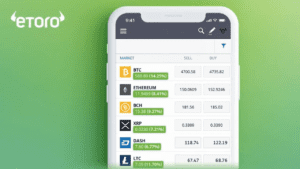In the world of investing, the term “safe haven” often evokes a sense of security, a refuge where your capital isn’t just preserved but also has the potential for growth. While no investment is entirely risk-free, certain markets demonstrate characteristics that render them more resilient to economic downturns and geopolitical uncertainties. One such market that frequently tops the list in Europe—and indeed globally—is Germany. This article aims to shed light on the multiple facets that make Germany a safe haven for investors. We will delve into its economic stability, examine the political climate, analyze financial markets, and explore various investment vehicles, all to provide a comprehensive understanding of why Germany remains a compelling choice for both casual investors and professional asset managers alike.
Economic Stability
One of the pillars that make Germany a safe haven for investors is its undeniable economic stability. Let’s explore the various components contributing to this stability.
Strong GDP
Germany boasts one of the most robust economies in the world, consistently ranking as the largest in Europe and among the top five globally. According to the World Bank, the country’s Gross Domestic Product (GDP) stood at approximately $3.8 trillion in 2020, demonstrating resilience even amidst the COVID-19 pandemic.
This strong GDP indicates a healthy economic environment and makes Germany an attractive proposition for investors. When a country has a growing and resilient economy, it typically offers better returns and lower risks. Investment opportunities are more abundant, and companies based in that country usually exhibit solid performance, thereby enhancing the value of equities and other financial instruments.
Join the world's biggest trading network & get instant access to a personal account manager!
Robust Infrastructure
Investor confidence is often influenced by the state of a country’s infrastructure, including its transportation systems, telecommunications, and utilities. Germany excels in this department, with state-of-the-art highways, a well-integrated public transport system, and a highly reliable energy sector. The country is also a pioneer in renewable energy technology, making significant strides in sustainability and environmental conservation.
Robust infrastructure not only improves the quality of life for citizens but also provides a fertile ground for businesses to flourish. Companies benefit from efficient logistics, lowering operational costs, and thereby boosting profitability. For investors, this translates to better performance of equity and debt instruments and a greater assurance of returns.
Diverse Economy
Germany’s economic strength doesn’t lie in just one or two sectors; it has a highly diversified economy that spans from manufacturing and automotive to technology and renewable energy. Its industrial sector is world-renowned, with powerhouse companies like Siemens, BASF, and BMW. Meanwhile, Germany is also home to globally recognized financial institutions like Deutsche Bank and Allianz.
This economic diversity acts as a natural hedge against downturns in any single sector. When one industry faces challenges, the odds are high that another is thriving, which helps to stabilize the overall economy. For investors, this diversification minimizes risk and provides multiple avenues for investment, ranging from blue-chip stocks in traditional industries to high-growth opportunities in sectors like technology and renewable energy.
Germany’s economic stability, underscored by its strong GDP, robust infrastructure, and diverse economy, plays a crucial role in its status as a safe haven for investors. These factors not only boost investor confidence but also offer a range of opportunities for capital growth, making Germany a compelling choice for any investment portfolio.
Political Climate
Another factor that adds to Germany’s appeal as a safe haven for investors is its political climate. A stable political environment can significantly impact investor confidence, policy directions, and international relations—all of which are integral for sound investments. Let’s delve into the aspects that make Germany’s political landscape investor-friendly.
Stable Governance
Germany has been a model of political stability, especially when compared to other countries that have gone through political upheavals or regime changes. The country operates under a parliamentary system that has provided reliable governance for decades. Elections are free and fair, and transitions of power are smooth. The rule of law is strong, and corruption levels are low.
This stability is reflected in policy continuity, which is particularly appealing to investors who crave predictability. When the rules of the game are consistent, businesses can plan for the long term, and investors can make decisions with a greater degree of confidence. In fact, political stability often correlates with economic stability, providing a double layer of security for investments.
Pro-Business Regulations
Germany is known for its pro-business environment, characterized by a legal framework that supports both local and foreign investments. Property rights are well-protected, and contractual laws are strictly enforced. There is a high degree of transparency in business operations, and the regulatory bodies are efficient and unbiased.
The country has also streamlined its tax policies and corporate laws to encourage investments. For instance, Germany offers various incentives for research and development (R&D), aiming to maintain its edge in technology and innovation. These pro-business regulations not only attract foreign direct investment but also encourage domestic enterprises to reinvest profits, contributing to economic growth and creating more opportunities for investors.
International Relations
On the global stage, Germany commands considerable respect and influence. It is not just the largest economy in the European Union but also a key member that plays a significant role in policy-making. Its political stability and strong economy make it a cornerstone of the EU, impacting policies that affect the entire continent.
Moreover, Germany has strong trading relationships with countries around the world, including major economies like the United States and China. Its commitment to multilateralism and international cooperation makes it a reliable trading partner and a key player in various international organizations like the United Nations, World Trade Organization, and NATO.
Germany’s role in international relations adds another layer of safety for investors. The country’s influence in global and regional political stability contributes to its resilience against economic downturns, thereby making it a more secure investment destination.
Its stable governance, pro-business regulations, and influential role in international relations combine to create a favorable political climate for investors. These elements not only reduce the inherent risks in investment but also provide a stable backdrop against which businesses and, by extension, investors can prosper.
Investment Vehicles
Investors have a variety of options when considering how to allocate capital in Germany. Each asset class—be it equities, bonds, or real estate—comes with its own set of characteristics, risk profiles, and potential returns. Understanding these options is crucial for creating a diversified portfolio that aligns with your investment goals. Let’s delve into these investment vehicles, focusing on what makes them appealing in the context of Germany’s status as a safe haven.
Equities
Popular German Companies to Invest In
Germany is home to an impressive array of companies that dominate both European and global markets. These companies are listed on the Frankfurt Stock Exchange, one of the world’s largest trading centers for securities. High-performing sectors include automotive, chemical, financial services, and technology, represented by flagship companies such as:
- Volkswagen: A leader in the automotive industry, Volkswagen has been expanding its focus on electric vehicles, making it a compelling long-term investment.
- SAP: A global software giant specializing in enterprise solutions, SAP is a tech stock that has consistently offered strong returns.
- BASF: A powerhouse in the chemical sector, BASF’s diverse product range and global footprint make it a stable investment option.
- Allianz: As one of the world’s largest insurance companies, Allianz offers financial stability and often pays out consistent dividends.
Investing in the equities of these market leaders allows investors to capitalize on Germany’s robust economy and technological prowess, making them compelling options for portfolio diversification.
Bonds
Different Types of German Bonds Available
German bonds are widely considered as low-risk investment options, suitable for investors looking for capital preservation and steady income. Here are the main types of German bonds you can consider:
- Bunds: These are long-term bonds with maturities ranging from 10 to 30 years. Bunds are often used as a benchmark for European debt and are highly liquid.
- Bobls: These are medium-term bonds with maturities ranging from 5 to 10 years. They offer a balance between yield and liquidity.
- Schatz: These are short-term bonds with maturities of two years or less. They are considered highly secure but offer lower yields.
- Jumbo Pfandbriefe: These are covered bonds backed by mortgages or public sector loans. They offer higher yields than government bonds but come with slightly higher risk.
Given Germany’s fiscal responsibility and strong economic indicators, these bonds provide options for conservative investors and those looking to balance out riskier assets in their portfolios.
Real Estate
Market Conditions and Why It’s a Good Investment
Germany’s real estate market has proven to be a resilient and rewarding investment avenue, especially in key cities like Berlin, Munich, and Frankfurt. Several factors contribute to this:
- Strong Economic Fundamentals: A robust economy increases demand for both residential and commercial properties.
- Low Interest Rates: Favorable financing conditions make it more accessible for investors to enter the real estate market.
- Population Growth: Major cities are experiencing an influx of both domestic and international migration, leading to increased demand for housing.
- Sustainability Trends: Germany’s focus on sustainable building practices adds another layer of appeal, especially for those interested in responsible investing.
Real estate investments can offer a combination of rental income and capital appreciation, making them a well-rounded addition to an investment portfolio.
Whether you are interested in equities, bonds, or real estate, Germany’s investment landscape provides a wealth of options suited to various risk appetites and investment horizons. These vehicles not only offer a path to capital growth but also come with the additional assurance of being part of one of the world’s most stable economies.
Risk Factors
Investing in Germany does come with its own set of risks, as is the case with any investment landscape. While the country offers a robust economy and political stability, it’s essential for investors to remain vigilant and informed about potential risk factors.
Economic Indicators
What to Watch Out For
While Germany has a strong and resilient economy, there are economic indicators that one should closely monitor:
- Inflation Rates: Although generally stable, unexpected spikes in inflation can erode real returns on investment.
- Interest Rates: Set by the European Central Bank (ECB), interest rate changes can have a significant impact on investment returns, especially in bonds and real estate.
- Trade Balance: Being an export-heavy economy, Germany is susceptible to global trade tensions or economic slowdowns in key markets like China and the United States.
By keeping an eye on these indicators, investors can gauge the overall health of the German economy and make more informed investment decisions.
Political Risks
Potential Challenges on the Horizon
Despite its current stability, Germany is not immune to political risks that could impact its investment climate:
- EU Politics: As a key member of the EU, any significant political upheavals within the bloc could indirectly affect Germany.
- Regulatory Changes: While Germany is currently pro-business, shifts in regulatory policies can impact specific sectors or the investment environment as a whole.
- Geopolitical Events: Germany’s international influence makes it susceptible to geopolitical tensions that could affect trade or diplomatic relations.
Conclusion
Germany’s reputation as a safe haven for investors is well-earned, underpinned by its robust economy, stable political climate, and diverse financial markets. The country offers a plethora of investment vehicles, from equities and bonds to real estate, each with its own set of advantages and potential returns. This robust and diversified landscape makes Germany a compelling destination for both individual and institutional investors looking for both stability and growth.
Final Recommendations for Different Types of Investors
- For Conservative Investors: Consider allocating a portion of your portfolio to German Bunds or other low-risk debt instruments. These offer reliable returns and capital preservation.
- For Growth-Oriented Investors: Look into equities, especially those in sectors like technology and renewable energy, which are likely to benefit from Germany’s focus on innovation and sustainability.
- For Balanced Investors: A mix of German stocks and bonds can provide a well-rounded portfolio, capturing both the growth prospects and the safety nets inherent in the German investment landscape.
- For Real Estate Investors: With strong economic fundamentals and growing urban centers, the German real estate market offers a sound investment for those seeking both rental income and capital appreciation.
In sum, Germany offers a multitude of investment opportunities that cater to various investment profiles and objectives. Its solid economic and political pillars serve as a reassuring backdrop, allowing investors to navigate the complexities of financial markets with a greater sense of security.

















